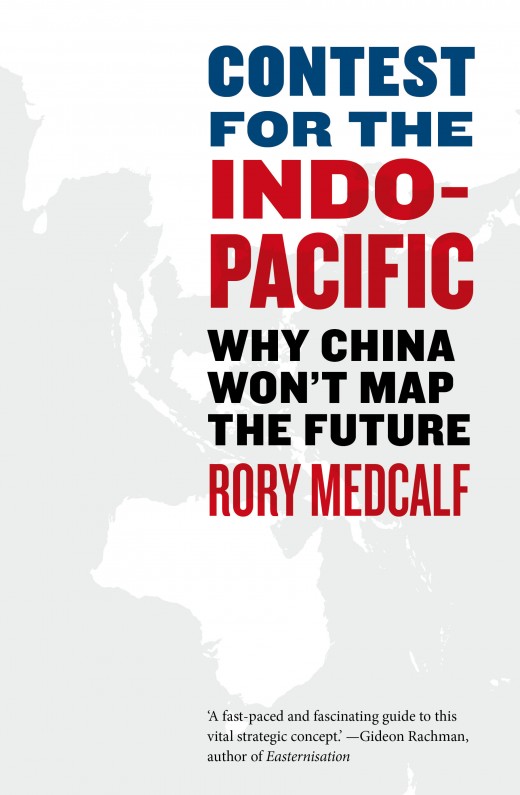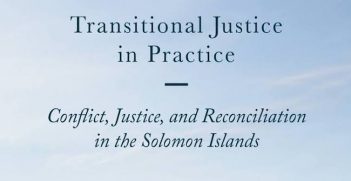Book Review: Contest for the Indo-Pacific: Why China Won’t Map the Future

The idea of the Indo-Pacific has rapidly become a major part of policy and analytical discussion in Australia. Few people in Australia can claim to be more enthusiastic or influential advocates of the Indo-Pacific idea than Rory Medcalf.
Given Australia’s geographic location at the centre of this notional region, such an outcome is not surprising, perhaps. What is more surprising is just how many other countries have adopted and promoted the idea. In this context, none has been more important than the United States. The US’s recent adoption of the term represents something of a triumph for Australia’s diplomatic corps and the policy entrepreneurs who have championed a rethinking of the way Australia sees its place in the world.
Rory Medcalf’s book is a keenly anticipated distillation of his thinking about a notion he has tirelessly promoted. Unsurprisingly, Medcalf thinks that the Indo-Pacific is an idea whose time has unambiguously come, primarily because of the rise of China and its destabilising impact on the more familiar “Asia-Pacific” region that had seemed secure under the reassuring auspices of American hegemony.
Readers wanting an explanation of why the Indo-Pacific came to displace other ways of thinking about the region, of which Australia is such a potentially important strategic part, could have no better guide. Indeed, even those who like to think they know something about the topic already will learn much from this book, not least about the idea’s early history and the evolution of the historical context from which it emerged. As Medcalf makes clear, this is region with a long and complex history, but one in which China has always played a pivotal part.
It still does. Indeed, Medcalf argues that “what makes the Indo-Pacific real is China’s own behaviour” (p. 4), something which is unsettling its neighbours and causing them to push back against its increasingly grandiose and assertive foreign policies. In this context, there is a direct interaction between China’s actions and the consolidation of a new regional identity: “the Indo-Pacific idea dilutes and absorbs Chinese influence. That is much of the point” (p. 23). In this regard, at least, it would seem that China is changing the map, although not in ways it might hope, perhaps.
The other big player in the region, of course—no matter what we call it—is the United States. Despite the erratic leadership of the current Trump administration, Medcalf is sanguine about its prospects, suggesting that “American power is more likely to adapt than decay” (p. 149). Just as well, perhaps, because “there is no substitute for the US alliance,” despite what he acknowledges as Australia’s participation in the “folly of invading Iraq” (p. 160).
The “China bad-American good” formula is, of course, the conventional wisdom in Australian strategic circles. To Medcalf’s credit he is a more subtle and informed observer than many in the security establishment, and yet the book is infused with some familiar ideas about the possible threat China poses. Seen from Beijing, this volume will, when translated, look like an extension of the logic of containment, even if it’s generally not called that anymore. Indeed, as Medcalf acknowledges, China is “joining a base race…that it didn’t start” (p. 206). Quite so.
Put differently, China is doing what great powers do: utilising its resources to assert itself and trying to create a world that mirrors its interests and preferences. This is, after all, precisely what the US has done for more than half a century. No doubt American values and interests are more compatible with Australia’s, but the extended critique of the impact and motivations for China’s Belt and Road Initiative seems a bit overdone. Was the Marshall plan any less “self-serving” or altruistic?
Such criticisms notwithstanding, this is a major contribution to the literature in this area and one that will be widely cited and influential, no doubt. Medcalf is optimistic that some form of “competitive coexistence” can be reached, in which China’s more aggressive inclinations are tempered by a combination of strategic reassurance and resolve. Indeed, despite the inherent threat China poses to the existing order, balance can be maintained, especially if India can be persuaded to play a more prominent role.
Medcalf is not only well-informed about India, however. On the contrary, he employs his extensive knowledge of the key regional players to produce the proverbial “must read” volume for anyone interested in the Indo-Pacific. It may not be too popular in Beijing, but it is likely to cement the author’s status as one of the most influential and insightful analysts of this topic in Australia. Hopefully, his view that “security is too important to be the purview of security agencies alone” (p. 261) will also be similarly well-received and acted upon in Canberra.
Mark Beeson is a professor of political science and international relations at the University of Western Australia and the AIIA National Research Chair, appointed in February 2017.
This is a review of Rory Medcalf, Contest for the Indo-Pacific: Why China Won’t Map the Future (La Trobe University Press, 2020) ISBN: 9781760641573 (paperback) & 9781743821046 (ebook).
This article is published under a Creative Commons Licence and may be republished with attribution.





